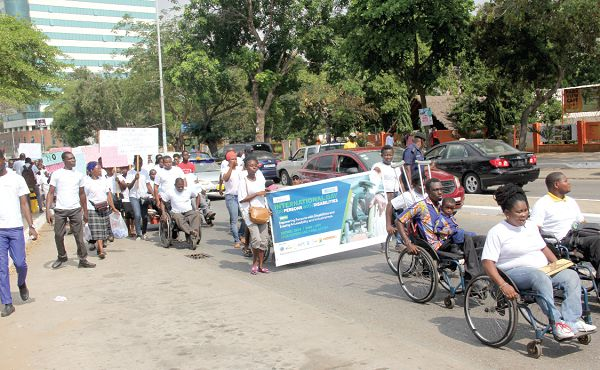
Let’s prioritise needs of persons with disabilities
As is the case elsewhere, disability in Ghana is often explained and understood through the individual model of disability. In addition, traditional and religious beliefs and deleterious stereotypes often characterise interpretations of disability.
Within such a context, it becomes difficult, if not impossible, for people, disabled and non-disabled, to acquire open-minded awareness, knowledge and understanding of disabilities.
Persons with disabilities (PWDs), therefore, continue to experience social stigma, social exclusion and discrimination.
Advertisement
Arguably, the most significant contributory factor to the continuous marginalization of PWDs in Ghana now is the weakness in aspects of the legal and regulatory structures meant to protect them.
The laws have been designed to challenge the stereotypes and traditional beliefs but as it stands, the stereotypes and traditional beliefs appear to be holding out very well against the antidiscrimination legal regime.
Advertisement
The Persons with DisabilityAct,2006 (Act 715) no doubt has been a noteworthy milestone in Ghana's human rights discourse because it gives the hope that it will improve the lives of PWDs to enable them to be part of mainstream society.
Though it covers key thematic provisions such as rights, accessibility, employment and education for PWDs, among others, it has been criticised on the grounds that it has no provision on non-discrimination, the gender dimension of discrimination, rights of children with disability and the legal definition of disability.
The act has also been faulted for not having specific provisions for the rights of women and children with disability, and also makes no provisions for housing needs of disabled people. The major public housing initiatives of successive governments in recent years have been done without particular focus on the residential needs of disabled people.
However, since the passage of the law in 2006, new buildings springing up daily in the country are still not disability-friendly and there is no effort on the part of owners of already existing structures to re-design them to make them accessible to the disability community in spite of the Building Act 2016.
It is still a challenge for members of the disability community to easily access public transport in the country. There are times PWDs are denied access to public vehicles because boarding such vehicles is a challenge, while those with mobility challenges have to battle it out with their wheelchairs.
Those with hearing impairment in the country are seriously discriminated against when it comes to accessing information on important national, health and security issues.
Unlike the visually impaired, who are easily identified with their white canes, the hearing impaired are more disadvantaged and sometimes, they suffer abuse because they are expected to have heard an instruction, which they presumably flouted.
Information available indicates that there are over three million PWDs in Ghana. This is critical.
The Daily Graphic is excited that the National Disability Council, the Ministry of Gender, Children and Social Protection and other stakeholders are spearheading a review of Act 715 to bring it on a par with the UN Convention on the Rights of Persons with Disabilities.
We sincerely hope that when the review is completed, the act will be more applicable, accommodating and welcoming enough to address the concerns of PWDs, who make up a significant part of the country’s population and are contributing in their different capabilities to the country’s growth and development.
